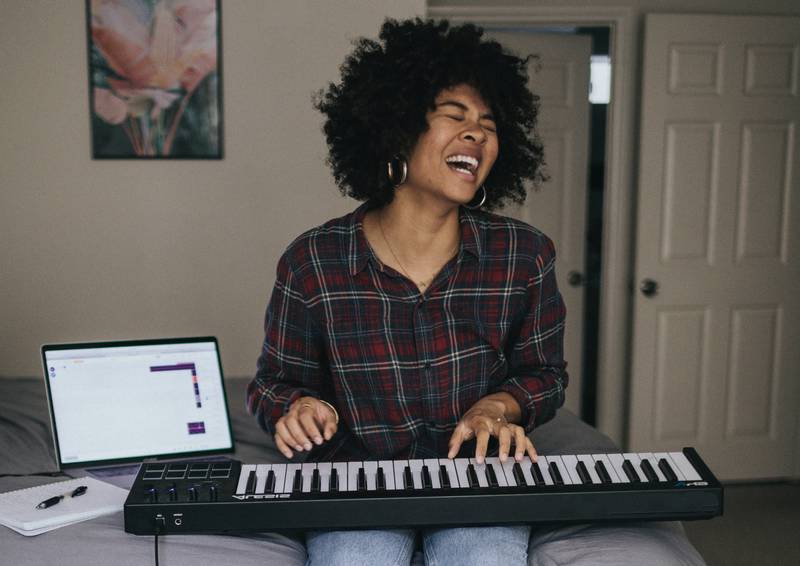Why Does My Dog Bark When I Sing? (+How to Stop It!)
Does your dog start barking every time you sing, and you’re not sure why or how to stop it? This article is just for you! We’re going to explain why dogs bark when you sing and how you can prevent this behavior.
We’ll explore whether your dog hates your singing or if they’re just trying to join in. We’re also going to discuss why some dogs howl instead of barking when you sing, and if dogs generally like it when you sing to them. Keep reading below!
Why Does My Dog Bark When I Sing?

Your dog barks when you sing due to various reasons such as joining in on perceived “pack” activity, responding to high-pitched sounds, or expressing excitement or distress. Understanding the triggers and context can help manage this behavior effectively.
Joining in on “Pack” Activity
Dogs are pack animals and often communicate and express themselves through vocalizations. When you sing, your dog may interpret this as a form of howling or barking – behaviors dogs use to communicate within a pack. Therefore, your dog might join in by barking, perceiving it as a communal activity.
Response to High-Pitched Sounds
Dogs have sensitive hearing and certain sounds can trigger a reaction from them. High-pitched singing can resemble the frequencies of a dog’s bark or a small animal’s cry, which can cause your dog to bark in response. They could be barking as a way of alerting you, or they may be confused and think you’re communicating with them.
Expressing Excitement or Distress
Your dog may bark when you sing out of excitement or distress. If your singing is associated with happy times, such as dancing around or being playful, your dog may bark out of joy and participation. On the other hand, if your dog appears distressed or agitated when you sing, they might be expressing discomfort, perhaps due to the volume or pitch of your singing.
How to Stop Dog Barking When You Sing
1. Use Basic Commands: Train your dog to understand basic commands such as “quiet” or “stop”. Reward them when they obey to reinforce the behavior.
2. Redirect Attention: Distract your dog with a toy or a command when you’re about to start singing. This can help redirect their attention away from the singing.
3. Positive Association: Associate your singing with positive things like treats or cuddles. Start singing softly and reward your dog for staying calm, gradually increasing the volume as they get more comfortable.
These steps will get your dog to stop barking when you sing, but it’s important to remember that the underlying behavioral issues (overexcitement, anxiety, etc.) that were causing all of this to begin with will still be present. And until you address them, any positive changes you see are only going to be temporary.
“Well, how do I make these changes stick?”
By getting your dog to truly choose to follow your direction, that’s how. I tried many times to write out how you can do that before deciding it made more sense to just link you to the free video series that explains it better than I’d ever be able to.
The series is by a man named Dan who is one of the world’s leading dog obedience trainers. In it, he teaches you how to put an end to things like when your dog barks when you sing and all other misbehavior using his fast and easy-to-follow methods.
In the first video, Dan will reveal to you why the two most common methods of dog training only doom you to failure. You can watch the video now by clicking here. Follow the proven system he’ll show you in his series and you’ll never have to spend another second worrying about your dog barking when you sing ever again!
Why Does My Dog Hate When I Sing?

Your dog hates your singing (or seems like it) due to factors such as the volume, pitch, or frequency of your voice, their own past experiences, or because they are picking up on your emotional state.
Let’s explore these factors in more detail:
- Varying Frequencies and Volumes: Dogs have a more sensitive hearing range compared to humans. The pitch and volume of your singing may be uncomfortable or even painful for them, especially if it’s high-pitched or loud. If your dog seems distressed when you’re singing, consider the possibility that it might be too loud or high for their comfort.
- Past Experiences: Dogs’ behaviors are often influenced by their past experiences. If your dog was previously exposed to loud noises or yelling in a negative context, they might associate your singing with those unpleasant experiences. This association might trigger a fear or anxiety response when you start singing.
- Misinterpretation of Your Emotions: Dogs are very attuned to human emotions. If you’re singing with a lot of emotion or passion, your dog might misinterpret this as you being upset or distressed. As a result, they might react with signs of stress or worry, which can come off as them disliking your singing.
- Unexpected Change: If you don’t sing often, your dog might be surprised or confused when you start. Dogs thrive on routine and predictability, so an unexpected change in your behavior, like breaking out in song, could be unsettling for them.
Understanding why your dog might not appreciate your singing can help you make adjustments and ensure your vocal performances are more enjoyable for both of you. Remember to observe your dog’s body language when you sing to gauge their comfort level. If they start barking, we explained what to do in the second section.
Allowing this to continue will only lead to their issue getting worse and appearing even more frequently. If you’re not already, you’ll soon also see your dog barking at the guitar, barking at the piano, and just barking at music in general. You certainly don’t want that, so it’s important to get to work on things!
Why Do Dogs Howl When You Sing?
Dogs howl when you sing because they perceive the singing as a form of howling, an instinctual behavior ingrained from their wolf ancestors, or they may be responding to certain pitches and frequencies in your singing. Understanding this behavior can help you better interact with your dog during your singing sessions.
Perception of Singing as Howling
Dogs are descendants of wolves, and one wolf-like trait that dogs have retained is the instinct to howl. In the wild, wolves use howling as a form of long-distance communication with members of their pack. Your dog, even though domesticated, still carries this trait.
When you sing, your dog may interpret the varying pitches and tones of your singing as a form of howling, which could encourage them to join in. This is their way of participating in what they perceive as a communal activity, much like their wolf ancestors would have done.
Response to Pitches and Frequencies
Dogs have a highly sensitive sense of hearing and can detect a wider range of frequencies than humans can. They are particularly sensitive to high-frequency sounds, some of which are inaudible to the human ear.
When you sing, especially in a high pitch, your dog may interpret these frequencies as similar to those produced by other dogs or animals in distress. This can trigger their instinct to respond, often resulting in a howl.
Excitement or Distress
Another possible reason why dogs howl when you sing is tied to their emotional state. If your singing sessions are often accompanied by activities your dog enjoys – perhaps dancing around the living room, getting belly rubs, or receiving treats – your dog may howl out of sheer excitement.
It becomes an expression of joy and participation. On the other hand, if your singing is particularly loud or reaches a pitch that is uncomfortable to your dog’s sensitive ears, their howling could be a sign of distress or discomfort.
In conclusion, understanding why your dog howls when you sing can provide useful insights into their behavior and how they perceive their environment. This understanding can help you modify your actions or work through your dog’s problems using training. We explained how to do that in the second section.
Do Dogs Like When You Sing to Them?
Whether dogs like when you sing to them can vary greatly depending on the individual dog, the tone and volume of your voice, and the song choice. Some dogs might enjoy the soothing rhythm of a song, while others may find it unsettling or confusing.
Let’s delve deeper into these factors:
- Individual Preferences: Just like humans, dogs have individual preferences. Some dogs may enjoy the sound of their owner’s singing, seeing it as another form of communication or bonding, while others may not be as receptive. It could depend on the breed, past experiences, or simply the dog’s personal preference.
- Tone and Volume: Dogs have sensitive hearing, and the tone and volume of your singing can impact their reaction. Soft, melodic tunes sung in a calm and soothing voice may be more appreciated by your dog, as opposed to loud, high-pitched, or overly enthusiastic singing which could potentially cause distress or discomfort.
- Song Choice: The type of song you choose to sing can also play a part in your dog’s reaction. Songs with a smooth, rhythmic flow can have a calming effect on dogs. On the other hand, songs with abrupt changes in rhythm, volume, or pitch might be less enjoyable for them.
- Emotional Connection: Dogs are extremely attuned to human emotions. When you sing to your dog, they might not understand the words, but they can certainly pick up on your emotional state. If you’re happy, relaxed, and enjoying singing, your dog is likely to respond positively to your emotional state.
- Perceived Attention: Dogs generally love attention from their owners. If your dog perceives your singing as a form of attention or interaction, they might actually enjoy it, irrespective of your vocal prowess. It’s another way for them to bond with you and enjoy your company.
So, whether your dog likes when you sing to them can depend on a variety of factors. Always pay attention to your dog’s reaction when you’re singing. If they seem relaxed and content, chances are, they enjoy your performances. However, if they show signs of discomfort or distress like barking, it might be best to save your singing for the shower.
I’m sure you’re looking forward to singing worry-free, so I’ll let you get started now. Best wishes with all of this, and thanks for reading our article “Why Does My Dog Bark When I Sing? (+How to Stop It!)”.





